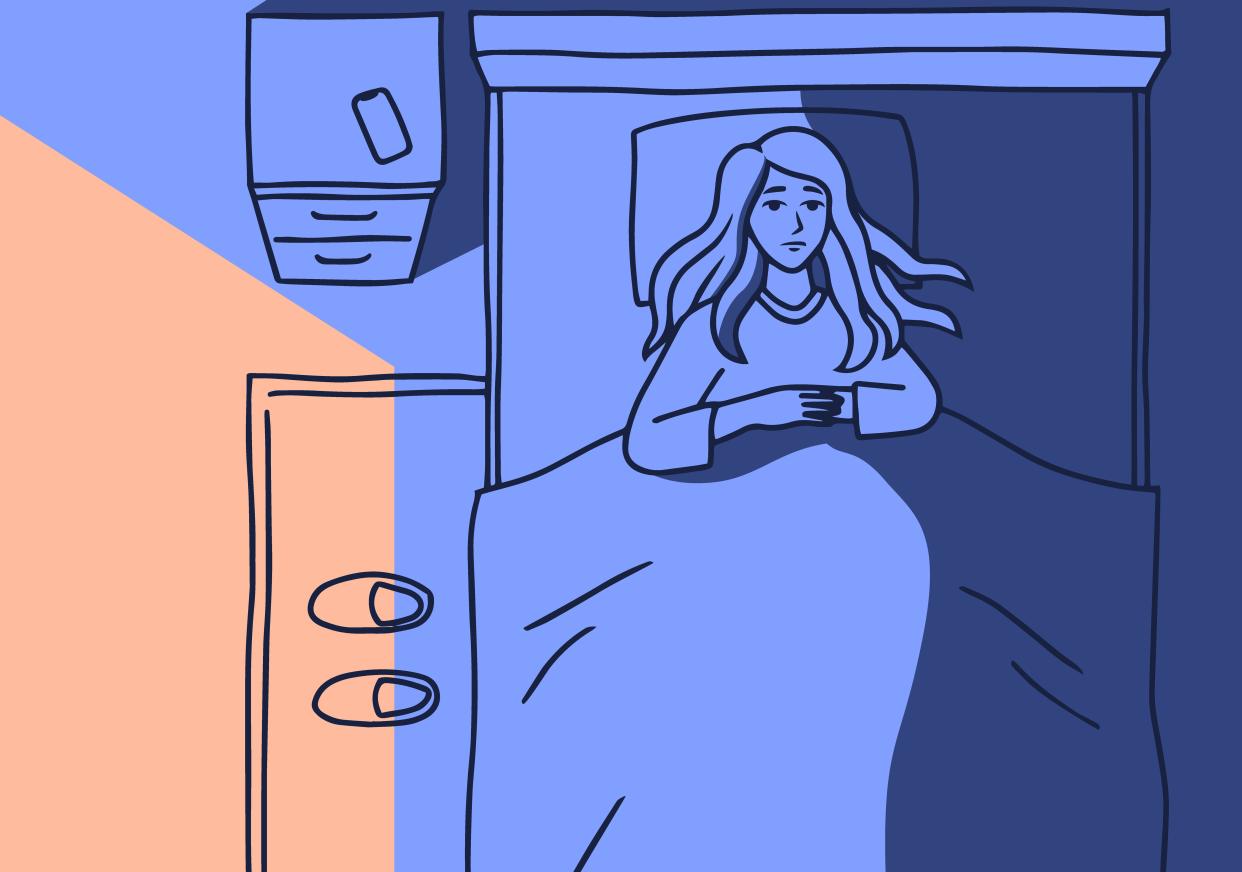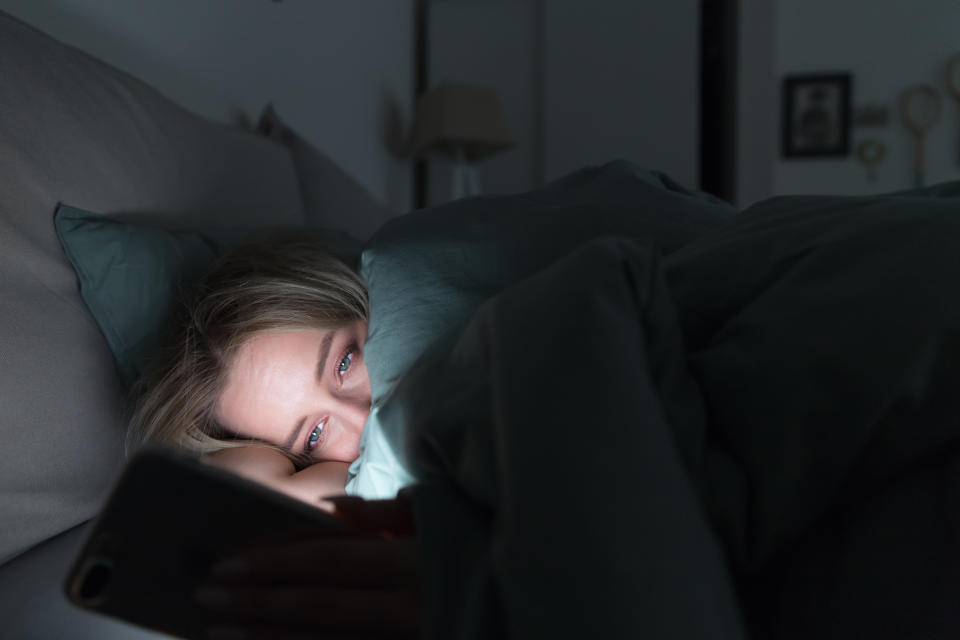9 Therapist-Approved Tips To Tackle Nighttime Anxiety

Tossing and turning in bed, anxious thoughts fill your mind: you think about all the things you haven’t done, the demands of the next day, an encounter with a colleague. Inevitably, those feelings of not being good enough creep in.
Nighttime is one of the most common times for people to experience anxiety, therapists tell HuffPost UK. Quite simply, it happens more then because that’s when we actually stop. If we’re already feeling stressed or overwhelmed in our lives, we experience these feelings more intensely when we get in bed.
“We can be so busy in the day that we don’t have time to think about what worries us,” Shelley Treacher, a psychotherapist and Counselling Directory member, explains. “Our systems may also already be in fight or flight mode, so it’s hard to slow down.”
Fearne Cotton, a UK-based broadcaster, recent admission that she’d been kept up by nighttime anxiety chimed with many of her fans. Cotton shared a photo on Instagram explaining in the caption how her anxiety crept up on her just as her head hit the pillow. And so began the downward spiral: she couldn’t drift off.
“Recently I have been sleeping so well, so last night was disappointing,” said Cotton, who has been vocal about her struggles with anxiety and panic attacks in the past. “But I’m not going to let one bad night set me back. If anything it’s a sign I have more important work to do. More self inventory, more self compassion, it’s a life’s work.”
Some of her followers noted that they, too, have nighttime anxiety, but their usual coping strategies don’t work in the evenings. Psychotherapist Kirsty Taylor suggests it’s because these strategies can be harder to access at night.
“Anxiety stores itself in the body and it needs to be moved up and out,” she says. “This can be harder to do at night, as can distraction techniques. It’s harder to rationalize things at night, too. You’re often lying in the dark thinking about things in a spiraling loop, feeling almost paralyzed.”
So what can you do about it?
Prepare for bed
Therapist Marteka Swaby recommends getting into a regular sleep routine so you’re striving for the same bed time and wake time each day. Avoid screens up to two hours before your head hits the pillow, she adds.
It might also help to transform your bedroom into a sanctuary, like an at-home spa. “Create a calm and soothing environment in your bedroom,” she says. “Oils and calming music can help with this.” Once in bed, Treacher suggests imagining you’re receiving a safe, full-body massage. “Start at your toes and imagine every little detail, and how it would relax you,” she says.
Acknowledge your anxiety
Rather than trying to ignore it, Treacher urges people to acknowledge anxiety in their bodies. “Be interested in where it actually is and what it feels like physiologically,” she says. “Sometimes just staying with a feeling helps it to shift. It is often the fear of the feeling, rather than the feeling itself, that is the difficulty.”
Breathe it out
Meditating or practicing deep breathing exercises before bed can help you offload any burdens and wind down. A good place to start is by taking 10 deep breaths. Taylor says focusing on breathing deeply in through your nose and out through your mouth should calm your fight-or-flight response.
“There are many good apps that can be downloaded and listened to that will focus your brain on something other than the anxious thoughts,” she says. Try Calm; Headspace; Insight Timer; and Stop, Breathe and Think.
Do a ‘polyvagal’ exercise
The vagus nerve – which is the longest cranial nerve in the body – can be used to counteract your stress response system, which is important in reducing anxiety. And the good news is: you can exercise it.
To calm your nervous system down, Treacher recommends sitting or lying comfortably. Now, turn your head to one side as far as is comfortable, turning your eyes as far as you can in that direction. “Stay there until you yawn, breathe deeply or sigh,” she says – and repeat on the other side.
Walk it off
If you’re lying in bed awake, feeling anxious, Jenny Wardle, a Counselling Directory member, recommends getting up, having a short walk around your home and making a warm (caffeine-free) drink to relax you.
Getting out of bed and engaging in an activity can help calm down the stress hormones being produced in your body, explains Taylor. Instead of pottering around and having a hot drink, you might want to read, write, sew or try yoga – all things that help get rid of adrenaline.

Try a grounding exercise
If you get back into bed and anxiety is still swirling, it can be helpful to practice a grounding exercise. This involves touching five things, seeing four things, hearing three things, smelling two things and tasting one thing, says Taylor.
“By taking your time to do this slowly – really feel the fabric or touch of what you feel against your skin and really see what it is in front of you and name it – you allow your internal system to regulate itself. You can do this out loud too, if appropriate.”
Take stock of the day
Can’t stop thinking about work, or something else that happened in the day? Wardle recommends taking stock of the situation: what really happened and what didn’t? How is the mind exaggerating? Are things really so bad?
It might help to make a quick list of what’s going on in your head. What are your top three worries? Now, add brief solutions to the issues you’ve written down. And we’re talking bite-size, actionable chunks – not lengthy paragraph-long conclusions.
Trick your brain into tiredness
Just as a baby tries to keep itself awake, try keeping your eyes open, and then letting them close, suggests Treacher.
“First, let your eyes close just a little. Then, open your eyes fully. Then, close your eyes a quarter way. After this, open your eyes. Repeat, gradually increasing the amount you close your eyes, until your eyes close fully, before opening your eyes again. This way of behaving like a baby may fool your brain into tiredness.”
Be kind to yourself
Lastly, be gentle with yourself for feeling this anxiety. Don’t get worked up or annoyed at yourself for feeling it – be kind.
“Often we feel frustrated with ourselves when we have a strong emotion. But it’s there for a reason,” says Treacher. “Explore how it’s trying to protect you. Be curious about what it’s actually wanting from you, and what it believes. You may find that it has held on to a belief that you no longer value.”
Ultimately, if the anxiety starts causing a disruption to your life, or stops you functioning well in your relationships, it’s a good idea to talk to a professional who can help you understand it and give you techniques for navigating it.
“Anxiety can be quickly resolved by talking through with a trained professional,” says Wardle. “It doesn’t have to be loads of sessions. Sometimes we just need someone to help us think a little more calmly and rationally.”
This post originally appeared in HuffPost UK.
Related...
What NOT To Say When Someone Shares Their Trauma With You
You Don't Need To Get Your Body 'Ready' For Summer
Want More Energy In The Morning? Try This Easy Science-Backed Method.
This article originally appeared on HuffPost and has been updated.


